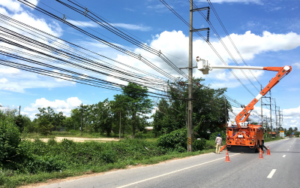
In the world of telecommunication, sub contractors play a crucial role in ensuring the smooth functioning of the industry. They are responsible for handling specific tasks under the supervision of the main contractor. One such vital aspect is the installation and maintenance of coax lines, which are essential for reliable transmission of signals. In this article, we will explore the role and responsibilities of a telecom sub contractor in Dallas, Texas, and discuss the importance of coax lines in telecommunication. Additionally, we will delve into the landscape of the telecom industry in Dallas, the process of hiring a sub contractor, and the challenges faced in this field along with effective solutions.
Understanding the Role of a Sub Contractor in Telecom
A sub contractor in the telecom industry is a professional who works alongside the main contractor to carry out various tasks related to telecommunication projects. These tasks may include installation, maintenance, repair, and troubleshooting of telecom infrastructure. The sub contractor is usually hired based on their expertise and specific skills required for the project. By partnering with a sub contractor, the main contractor can effectively manage workload and ensure timely completion of projects.
Key Responsibilities of a Telecom Sub Contractor
A telecom sub contractor in Dallas is responsible for performing a wide range of tasks, including:
- Installing and configuring telecom equipment
- Laying and terminating coaxial cables
- Testing and troubleshooting network connections
- Ensuring compliance with industry standards and safety regulations
- Collaborating with the main contractor and other team members
These responsibilities require the sub contractor to have a strong technical background and knowledge of telecommunication systems.
Essential Skills for a Telecom Sub Contractor
Being a sub contractor in the telecom industry demands a set of specialized skills. Some of the essential skills for a telecom sub contractor include:
- Proficiency in coaxial cable installation and termination
- Understanding of networking concepts and protocols
- Familiarity with telecom equipment and tools
- Attention to detail and accuracy in work
- Ability to interpret technical drawings and specifications
- Effective problem-solving and troubleshooting skills
Having these skills is vital for a telecom sub contractor to deliver high-quality work and meet the requirements of the project.
The Importance of Coax Lines in Telecommunication
Coaxial cables, often referred to as coax lines, play a critical role in telecommunication systems. These cables are designed to transmit high-frequency signals with low loss and minimal interference. Coaxial cables consist of a center conductor, an insulating layer, and an outer conductor. The insulating layer and outer conductor shield the inner conductor from external interference, ensuring reliable transmission.
Basics of Coaxial Cable Technology
Coaxial cables are widely used in various telecommunication applications due to their unique characteristics. The technology behind coaxial cables is based on the principle of electromagnetic wave transmission. The center conductor carries the electrical signal, while the outer conductor provides shielding to prevent signal degradation. This construction allows for high-speed data transfer and the ability to transmit signals over long distances without significant loss of quality.
Applications of Coax Lines in Telecom
Coax lines find extensive use in the telecom industry for various purposes, including:
- Transmission of cable television signals
- Internet connectivity and broadband services
- Interconnecting network devices
- Telecommunication infrastructure for businesses and residences
Due to their versatility and reliability, coax lines continue to be a crucial component of modern telecommunication systems.
The Telecom Landscape in Dallas
Dallas, Texas, is a thriving hub for the telecom industry. The city’s strategic location, business-friendly environment, and robust infrastructure have made it a prime destination for telecom companies to establish their presence. Dallas is home to several major telecom providers and has witnessed significant growth in recent years.
Overview of Dallas’s Telecom Industry
The telecom industry in Dallas encompasses a wide range of services, including wireless communication, internet service provision, and cable television. Telecom companies in Dallas offer reliable connectivity solutions to businesses and residents, enabling seamless communication and access to information. This industry has a significant impact on the local economy, attracting investment and creating job opportunities.
Future Trends in Dallas’s Telecom Sector
The telecom sector in Dallas is continually evolving to keep pace with technological advancements and increasing consumer demand. Some of the future trends expected in Dallas’s telecom industry include the expansion of 5G networks, the growth of Internet of Things (IoT) services, and the development of smart city infrastructure. These trends present exciting opportunities for telecom sub contractors to contribute to the progress of the industry.
Hiring a Telecom / Coax Line Sub Contractor in Dallas
When hiring a sub contractor for telecom or coax line projects in Dallas, it is essential to consider several factors to ensure the success of the project. Here are some key points to look for when selecting a sub contractor:
What to Look for When Hiring a Sub Contractor
1. Experience and expertise in telecom installations and coaxial cable work
2. Positive reputation and proven track record of delivering high-quality projects
3. Knowledge of industry standards and best practices
4. Adequate resources, including skilled technicians and necessary equipment
5. Strong communication and collaboration skills to work effectively with the main contractor and project team
The Hiring Process Explained
The process of hiring a telecom sub contractor typically involves the following steps:
- Identify the project requirements and determine the specific tasks for the sub contractor.
- Collect and review proposals from potential sub contractors, considering their experience, references, and cost estimates.
- Conduct interviews or discussions with shortlisted candidates to evaluate their technical knowledge and compatibility with the project.
- Select the most suitable sub contractor based on the evaluation and negotiate the terms and conditions of the contract.
- Monitor the progress and quality of work throughout the project, ensuring compliance with contractual obligations.
- Complete the project and assess the sub contractor’s performance for future reference.
This hiring process helps ensure that the right sub contractor is chosen, leading to successful project outcomes.
Challenges and Solutions in Telecom Sub Contracting
Sub contracting in the telecom industry presents a unique set of challenges that can impact project timelines and quality of work. However, with effective strategies and solutions, these challenges can be overcome to ensure smooth operations.
Common Challenges in Telecom Sub Contracting
Some of the common challenges faced in telecom sub contracting include:
- Tight deadlines and pressure to complete projects quickly
- Coordination and communication issues between the main contractor and sub contractor
- Managing multiple projects simultaneously
- Adapting to evolving technology and industry standards
- Ensuring compliance with safety regulations and quality standards
Effective Solutions for Sub Contracting Issues
To address these challenges, telecom sub contractors can implement the following solutions:
- Effective project planning and scheduling to optimize time management
- Clear and frequent communication with the main contractor and project team
- Implementing project management tools and software for better coordination
- Continuously updating skills and knowledge through professional development and training
- Maintaining a culture of safety and quality within the sub contractor’s organization
By implementing these solutions, telecom sub contractors can overcome challenges and deliver exceptional results to their clients.
Conclusion
In the dynamic world of telecom, sub contractors specializing in coax lines play a vital role in ensuring reliable and efficient communication. Their expertise and skills are crucial for the installation, maintenance, and troubleshooting of telecommunication infrastructure. As Dallas continues to thrive in the telecom industry, the demand for competent sub contractors remains high. By fully understanding the responsibilities, skills required, and the significance of coax lines, individuals and businesses can hire the right telecom sub contractor for their projects. Despite the challenges faced in this field, effective solutions are available to ensure successful outcomes and contribute to the growth of the telecom industry in Dallas, Texas.
If you’re looking for a trusted partner to handle your telecom and coax line projects in Dallas, look no further than Whitmore Construction. With our expansive experience and commitment to safety, quality, and customer service, we are equipped to manage your utility construction needs from design and engineering to full-scale network deployment. Our team is ready to tackle the complexities of both aerial and underground cable placement, ensuring that your project is executed flawlessly. For comprehensive power line construction and electric utility services that meet and exceed your expectations, Contact Us Today! Let us bring our expertise and dedication to your next project, ensuring its success every step of the way.
